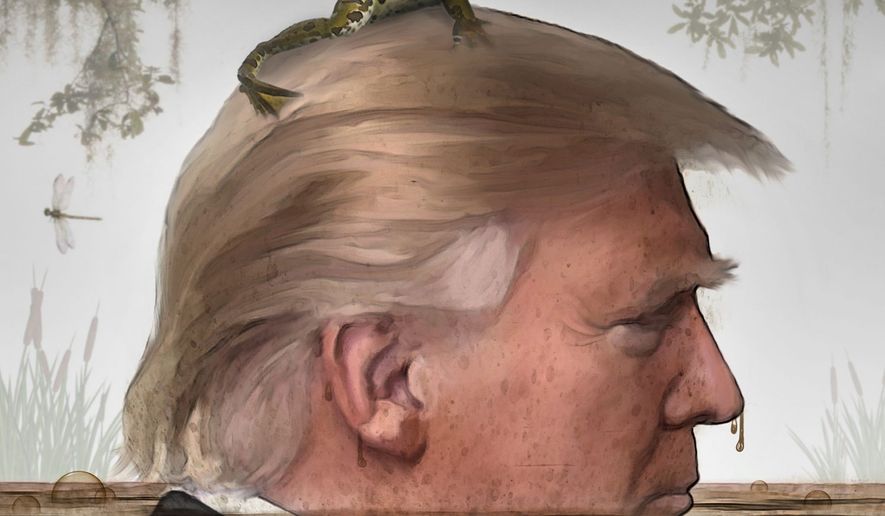OPINION:
It is hard to recall when America has had to endure a more tumultuous, scandal-plagued period in the first two years of a new administration.
Donald Trump won the presidency, promising to make America “great again,” only to immediately sink into a widening quagmire of corruption, ineptitude, duplicity and deepening political divisions across the country.
It is even harder to remember a young presidency that has become so immediately beset by infighting within his own administration, resulting in a constant stream of top White House advisers, Cabinet secretaries and dozens of other officials resigning their posts, or being fired by the president.
On top of all that, throw in Moscow’s disinformation warfare campaign during the 2016 presidential race that Mr. Trump still insists is “fake news,” but that our intelligence agencies say was aimed at American voters to help elect him to office.
Indeed, just this week, The Washington Post has added additional corroboration to support our intelligence:
“A report prepared for the Senate that provides the most sweeping analysis yet of Russia’s disinformation campaign around the 2016 election found the operation used every major social media platform to deliver words, images and videos tailored to voters’ interests to help elect President Trump — and worked even harder to support him while in office,” The Post revealed.
The research, which studied millions of posts provided by major technology firms, was given to the full Senate Intelligence Committee by Oxford University’s Computational Propaganda Project and Graphika, a network analysis firm.
It contained “new details on how Russians working at the Internet Research Agency, which U.S. officials have charged with criminal offenses for interfering in the 2016 campaign, sliced Americans into key interest groups for targeted messaging,” The Post reported Monday.
“The data sets used by the researchers were provided by Facebook, Twitter and Google and covered several years up to mid-2017, when the social media companies cracked down on the known Russian accounts,” The Post reported.
“What is clear is that all of the messaging clearly sought to benefit the Republican Party — and specifically Donald Trump,” the report said.
“Trump is mentioned most in campaigns targeting conservatives and right-wing voters, where the messaging encouraged these groups to support his campaign. The main groups that could challenge Trump were then provided messaging that sought to confuse, distract and ultimately discourage members from voting,” the report added.
The Russian messaging “aimed particular energy at activating conservatives on issues such as gun rights and immigration.”
The report also shows how the Russian messaging sought to reduce the clout of African-American voters “by undermining their faith in elections and spreading misleading information about how to vote.”
But no single characteristic of Mr. Trump’s presidency tells us more about his ineptitude at staffing his administration than the nearly three dozen officials he has had to either fire for their incompetence, or who resigned because of they disagreed with his policies.
At the top of the list is Chief of Staff John Kelly, a highly regarded former Marine Corps general who battled fiercely with Mr. Trump over policy, to the point where they stopped talking to one another. Mr. Kelly leaves office at the end of this month.
Others were tone deaf officials who lurched from one spending scandal to another. Interior Secretary Ryan Zinke was one of the worst. By the time he announced he was leaving, he was the target of 15 internal investigations for wasteful spending and excessive travel expenditures.
Apparently, Mr. Trump is unaware of this, saying “Ryan has accomplished much during his tenure and I want to thank him for his service to our Nation.” He leaves at the end of the month.
Then there’s Scott Pruitt, the Environmental Protection Agency administrator, who was the target of a number of federal investigations for lavish spending habits. He quit in July.
And there was U.N. Ambassador Nikki Haley, who was tough as nails on Russia’s role in the poisoning of two former Russian agents in the U.K., and Moscow’s support for Syrian dictator Bashar Assad, while Mr. Trump spoke glowingly of Vladimir Putin.
She unexpectedly announced her resignation Oct. 9, saying it was “time for a break.” She gave no further explanation.
• Donald Lambro is a syndicated columnist and contributor to The Washington Times.




Please read our comment policy before commenting.